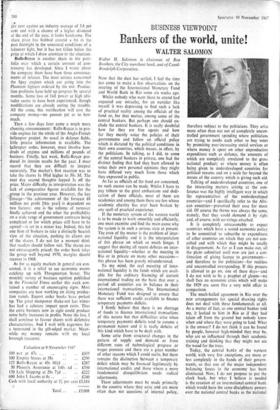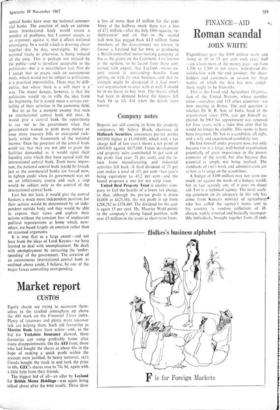Bankers of the world, unite!
BUSINESS VIEWPOINT WALTER SALOMON
Walter H. Salomon is chairman of Rea Brothers, the City merchant bank, and of Canal- Randolph Corporation.
Now that the dust has settled, I feel the time has come to make a few observations on the meeting of the International Monetary Fund and World Bank in Rio some six weeks ago.
Whilst nobody who went there to attend had expected any miracles, for an outsider like myself it was depressing to find such a lack of practical reality among the officials of the fund or, for that matter, among some of the central bankers. But perhaps one should ex- clude the central bankers. It is really doubtful how far they are free agents and how far they merely voice the policies of their governments and follow an official policy which is dictated by the political conditions in their own countries, which means, in effect, by the politicians. In talking, as I did, to some of the central bankers in private, one had the distinct feeling that had they been allowed to voice their Awn personal opinions they might have differed very much from those which they expressed in public.
As far as officials of the fund are concerned, no such excuse can be made. Whilst I have to pay tribute to the great enthusiasm and dedi- cation of these officials, most of them are academics and among them there are few whose academic chastity has ever been broken by any spell of practical experience.
If the monetary system of the western world is to be made to work smoothly and efficiently, one must examine and find the main cause why the system is in such a serious state at present. The crux of the matter is the problem of inter- national liquidity and it is the interpretation of this phrase on which so much hinges. I suggest that during all recent debates on inter- national liquidity—whether at the meeting in Rio or in private on many other occasions— this phrase has been grossly misunderstood.
To my mind, the real meaning of inter- national liquidity is the funds which are avail- able for the ordinary financing of current international trading on the basis that over a period all countries are in balance in their international transactions. The International Monetary Fund was designed to ensure that there was sufficient credit available to finance temporary payments deficits.
I firmly believe that there is no shortage of funds to finance international transactions of this nature but that difficulties arise when temporary payments deficits tend to assume a permanent nature and it is really deficits of this kind which have to be dealt with.
Some arise from structural changes in the pattern of supply and demand or from different rates of technological progress or wages pressure and there are a great number of other reasons which I could recite, but there remains the distinction between a temporary deficit which may be financed legitimately by international credits and those where a more fundamental disequilibrium needs radical adjustments.
These adjustments must be made primarily in the country where they arise and are more often than not questions of internal policy,
therefore subject to the politicians. They arise more often than not out of completely uncon- trolled government spending where politicians are trying to outdo each other to buy votes by promising ever-increasing social services or where money is spent on other unproductive expenditure such as defence, the amounts of which are completely unrelated to the gross national product; or where money is often being given to underdeveloped countries for political reasons and on a scale far beyond the means of the country which is giving such aid.
Talking of underdeveloped countries, one of the interesting matters arising at the con- ference was the highly intelligent way in which the representatives of the underdeveloped countries—and I specifically refer to the Afri- can countries—presented their case for more aid. Of course the theme was always the same, namely, that they could demand it by right and, of course, with no strings attached.
It is completely unreasonable to expect countries which have a sound economic policy to be committed to subscribe to expenditure of other countries on which they are not con- sulted and with which they might be totally in disagreement. As far as I 'can make out, all the plans submitted until now are just a con- tinuation of giving licence to governments— and therefore to the politicians—for reckless and uncontrolled overspending. If this process is allowed to go on, one of these days—and I do not wish to be a prophet of gloom—we shall face an economic crisis which will make the 1929 era seem like a very mild affair in comparison.
The much-hailed agreement in Rio over the new arrangements for special drawing rights does not deal with these fundamentals at all. As a matter of fact, as one central banker told me, it looked to him in Rio as if they had taken off from the ground but nobody knew when and where they were going to land. What is the answer? I do not think it can be found by people, however high-minded they may be, who are so influenced through their academic training and thinking that they might not see the wood for the trees.
Today, the central banks of the western world, with very few exceptions, are more or less completely in the hands of their govern- ments, so that one of the major independent balancing forces in the economy has been eliminated. Now, I do not propose to put the clock back, but what I believe is needed is the creation of an international central bank which would have the same disciplinary powers over the national central banks as the national
central banks have over the national commer- cial banks. The creation of such an autono- mous international body would create a number of problems, but I cannot accept, as an argument against it, that it affects national sovereignty. In a world which is drawing closer
together day by day, sovereignty, by inter- national treaty or otherwise, is being reduced
all the time. This is perhaps not noticed by the public—and is therefore acceptable to the politicians—but it is nevertheless real. Nor do I accept that to create such an autonomous body, which would not be subject to politicians, is a practical impossibility. There may be diffi- culties, but where there is a will there is a way. The major danger, however, is that the politicians would try to stifle the idea from the beginning, for it would mean a serious cur-
tailing of their activities in the economic field. But let us for a moment assume that such an international central bank did exist. It
would give a central bank the opportunity to say 'no' to the government when that government wanted to print more money or issue more treasury bills or overspend reck- lessly within the framework of the national income. Then the governor of the central bank could say that they are not able to grant the facilities demanded as it would upset their liquidity ratio which they have agreed with the international central bank. Even more impor- tant, the national central bank would be forced, just as the commercial banks are forced now, to tighten credit when its government was set on an inflationary course and such a step would be subject only to the control of the international central bank.
Last but not least, it would give the central bankers a much more independent position, for their actions would be determined by an inde- pendent outside body and they would be able to express their views and explain their actions without the constant fear of unpleasant political repercussions at home which, now- adays, are based largely on emotion rather than on reasoned arguments.
It is true that to a large extent—and not least from the ideas of Lord Keynes—we have learned to deal with unemployment. He dealt with unemployment by correcting the 'under- spending' of the government. The creation of an autonomous international central bank as outlined above could, I believe, be one of the major forces controlling overspending.







































 Previous page
Previous page